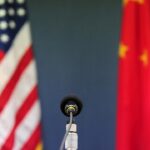As various social media platforms from the mainland went viral in recent months in the island of Taiwan, youngsters from the island told the Global Times at an event in Xiamen that internet has become a rare channel for people across the Straits to connect, serving a unique bridge that facilitates understanding and cultural integration.
They believe that amid the increasingly complex situation, people across the Straits should not give up even the tiniest opportunity to promote the peaceful reunification and that opposition voices from the Democratic Progressive Party (DPP) have just showed that “we are on the right path.”
The 2023 China Internet Civilization Conference was held in the city of Xiamen in East China’s Fujian Province from July 18 to 19, during which young people and representatives from the island shared their views on promoting cultural integration across the Straits through the internet.
Ma Yen-pin, Dean of Research Institute of Integral Development across the Taiwan Straits, told the Global Times at the event that youngsters in Taiwan love to use mainland social media apps including Douyin, Xiaohongshu (Little Red Book), and China’s Twitter-like Sina Weibo.
There are actually many “intersections” between young people from both sides of the Straits, and as long as there are intersections, problems can be resolved. What we need to do is to support them, even if they argue with each other sometimes, Ma said.
“It doesn’t matter, because arguing is better than not communicating at all. In fact, the more they argue, the more familiar they will become with each other. And then they will realize that the gap between the two sides is not that big after all.”
Fan Jiangfeng, a young entrepreneur from Taiwan, shared with the Global Times his experience of cultural exchanges between the two sides. He runs an entrepreneurship base in Xiamen and has so far helped some 20,000 young people from Taiwan visit the mainland and facilitated the successful implementation of hundreds of entrepreneurial projects for Taiwan youth.
In 2015, Fan and his mainland partner created a creative IP based on Zhu Xi, a prominent scholar of Neo-Confucianist and representative of the School of Min during the Southern Song Dynasty (1127-1279). They developed a cartoon series featuring Zhu Xi, which garnered over 300 million views online and successfully reached a wide audience across the Straits through social media platforms.
This initiative highlighted the significance of culture as a bridge between the mainland and Taiwan, Fan told the Global Times. He believes that culture is the key to increasing the sense of identity among Taiwan’s youth.
“From TV and films to social media platforms, people are starting to share their lives and experiences, and I believe that this genuine and sincere interaction can foster a more friendly relationship among young people across the Straits,” Fan said. “Online space can be the first step, allowing them to see the beauty of the mainland and develop an affinity for it. Once they set foot on the mainland, I believe their thoughts and perspectives will be different.”
Lee Wei-kuo, chairman of the Taipei-based Chinese Youth Trade Development Association, said the significance of the internet lies in its ability to bring the development situation of the mainland closer to Taiwan compatriots even under interferences from the outside.
Lee gave an example during the COVID-19 pandemic. He came to the mainland in February 2020 a few months after the pandemic broke out, and was immensely impressed by the preventive measures the mainland had taken, which enabled them to fully resume business by the end of February.
He then took photos and videos of preventive measures on the mainland and sent them to his Taiwan friends, who were astonished as they would never learn about this side of the coin from Taiwan media.
In recent years, the DPP authorities in Taiwan have continuously hyped up the “cognitive warfare” against mainland, with popular mainland social media platforms such as Douyin and Xiaohongshu becoming their targets.
According to reports from local media, the DPP authorities announced that Douyin and Xiaohongshu have been classified as “products that pose a threat to Taiwan’s information and communication security,” and their use has been restricted in government departments and affiliated areas, adding that the scope of these restrictions may expand to the general public in the future.
The DPP authorities’ aggressive actions have sparked public fury, with people on the island condemning the “green terror” and criticizing the DPP for undermining freedom of speech.
“Given the close proximity and shared culture between Taiwan and the mainland, young people should have the right to choose which information to receive and what content to engage with. The DPP authorities should not blur the lines between this kind of exchange and so-called ‘cognitive warfare.’ If that were the case, why not just isolate the island completely?” Lee said, slamming the DPP at the event.
“We can see from the DPP’s actions that these efforts between both sides have begun to show positive results in promoting understanding. And that suggests it is the right thing to do. Amid an increasingly tense situation, it is precisely in challenging times that we should not be pessimistic, but rather adopt a positive perspective,” Ma Yen-pin told the Global Times.
Peaceful reunification is in the best interest of both sides, so it is worth making every effort and not giving up any hope or chance, Ma stressed.
(Global Times)




